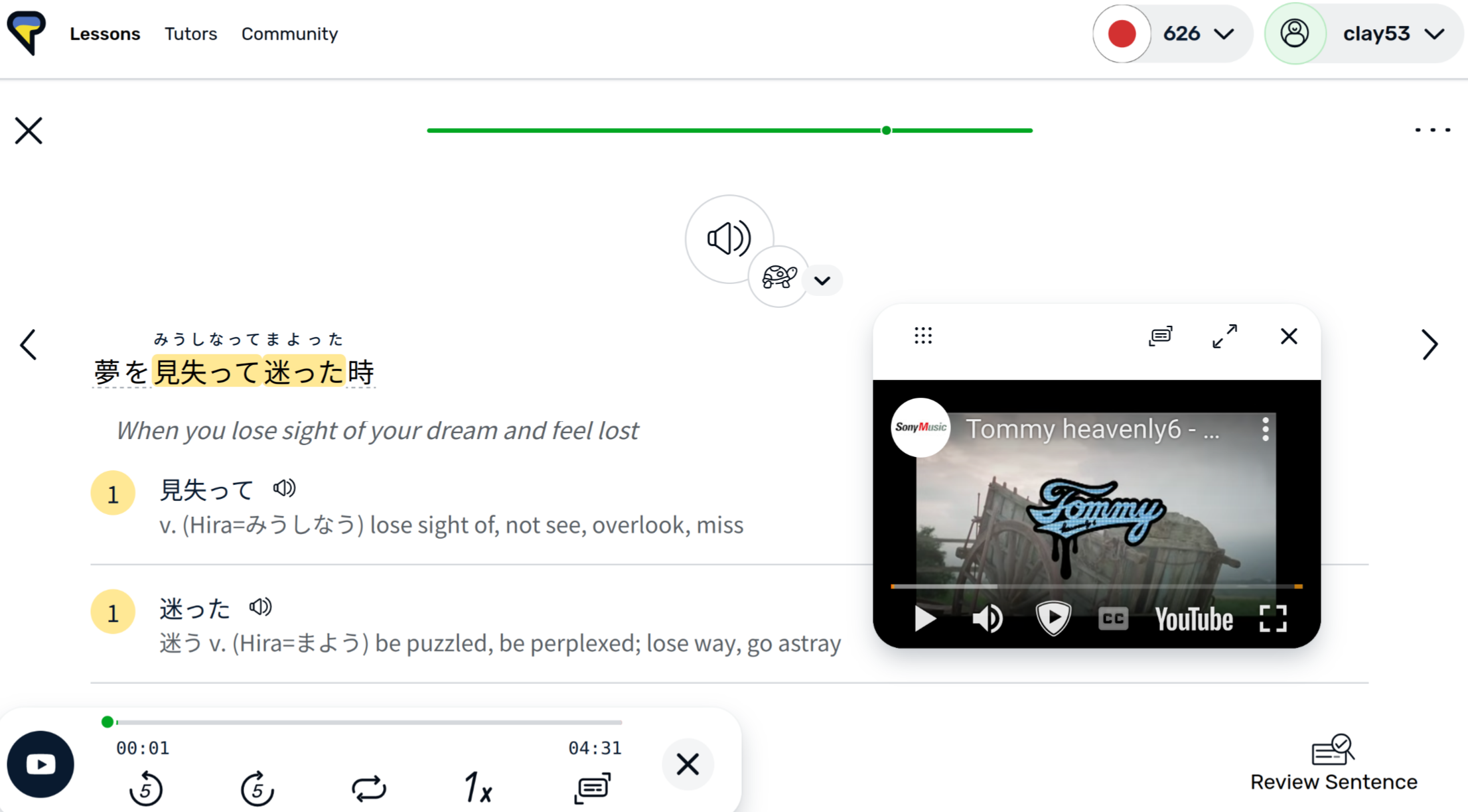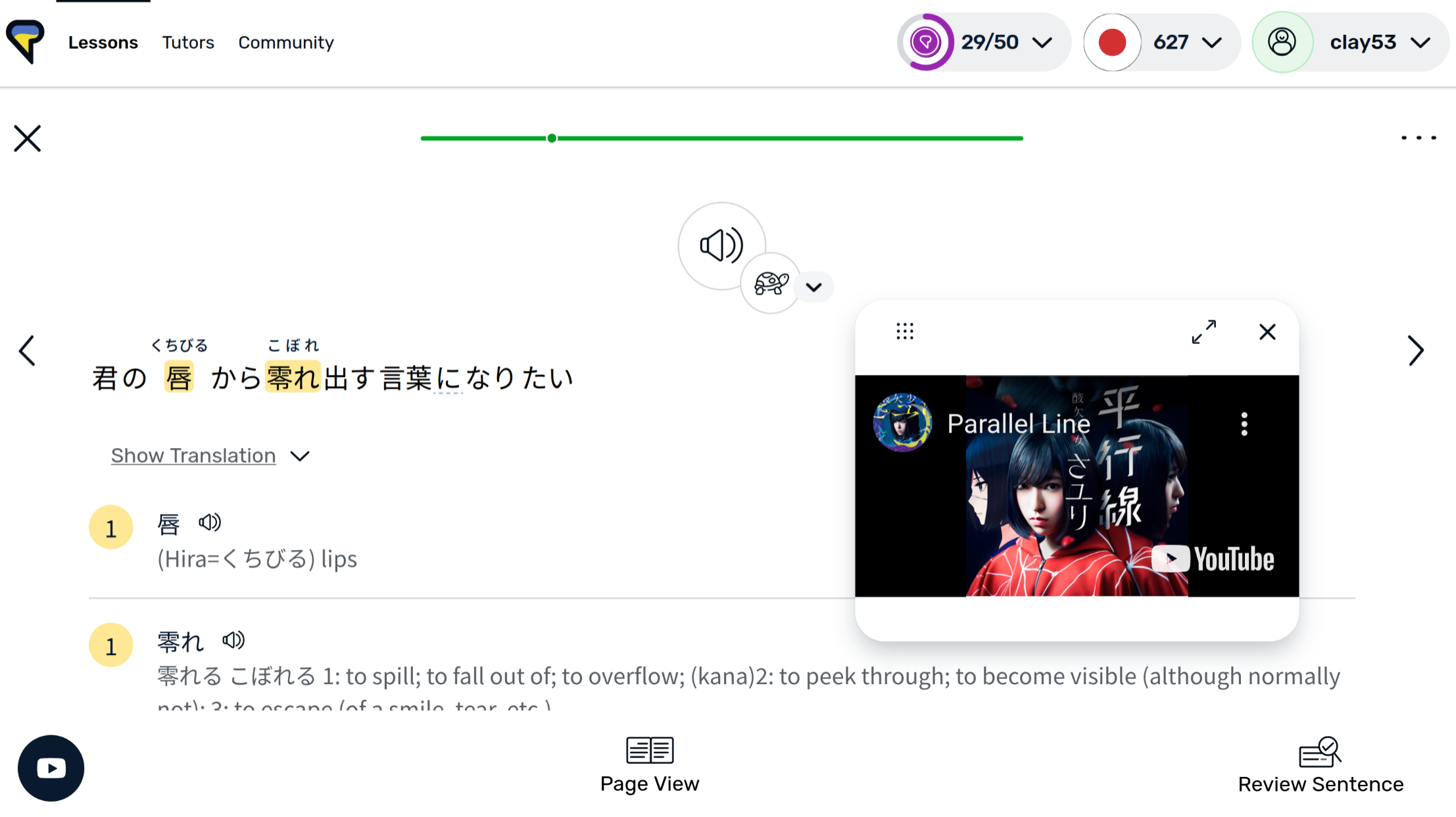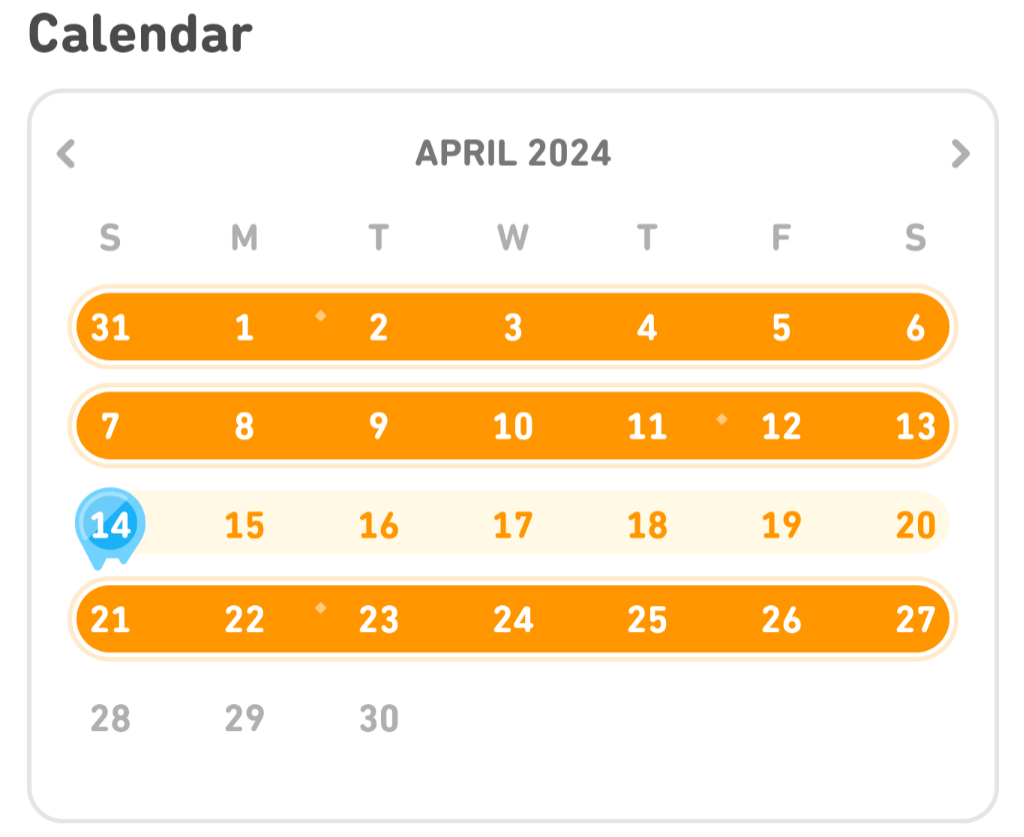voiceover:
Language Learning Log Week #1
I love watching/reading language learning content. This is expected for me considering my reasoning for wanting to learn a language in the first place. I started playing music because I heard it made you smarter. I hated high school band because I was not allowed to play (even in rehearsal - priority for the limited drums we had were given to upperclassman even though throughout previous years we were expected to bring our own drum, so I had one), so I decided, to keep myself sharp, I should start learning a language. I considered that the best language for this goal would be Mandarin Chinese since it's considered one of the hardest languages for English speakers, is the most spoken language, and I wanted to learn more about China.
I switched after about a year of study to Japanese for a few reasons. Firstly, I studied from the perspective that each character had a unique pronunciation and meaning. Now obvious to me, each character's pronunciation and meaning is highly dependent on the word. I felt that I held this perspective for too long and I that I had somehow screwed myself. Secondly, Japanese also has Chinese characters (also called a script) and 2 alphabets (also called scripts). I thought Chinese characters (hanzi) were super cool, so Japanese kanji (one of the 3 Japanese scripts), which are loaned from hanzi, were a fine replacement. Thirdly, once I got tired of Duolingo, I started using language partners. My language partners were very nice, and I believe helped me learn Chinese much faster than before. However, they were too nice and wanted to get to know me too well, which made me very uncomfortable and still uncomfortable about language partners to this day. So, when WeChat updated their terms of service and locked my account, I didn't go through the effort to fix it. Fourthly, I found it difficult to find engaging Chinese immersion material, but I found it really easy to find engaging Japanese immersion material (anime).
Switching to Japanese was difficult, but my knowledge of Chinese characters did help a bit. I have been studying Japanese off-and-on for almost 4 years now, and I have enjoyed it for more than just the technical aspects of the language that was really my initial draw.
Oh, I should also note I studied Spanish each of my 4 years of high school, but I wouldn't say I know Spanish well except for my ability to read to some extent (speaking, writing, listening - definitely not well).
Coming from my perspective though, I'm probably more interested in the science of language learning, figuring out what makes a language learning method effective and why. Generally, this is why, despite how long I've been studying for, I still only know maybe elementary Japanese (on the transition from N4 to N3 (JLPT)/A2 to B1 (CEFR)/upper beginner to lower intermediate - at least, that's what I'd like to believe). This interest is part of the reason why I've also been developing a language learning app, Tutor Engine, for the past 5 years (heavily off-and-on with many rewrites to be clear).
This summer, I will finish it. Though, as you may think as well, I think, "how can someone who is basically monolingual possibly sell a language learning app?". I justify it to myself by considering that the experience of not knowing a second language could be lost to someone who already knows 2 or more languages and that I'm going to hire people to help create the actual explanations and exercises/teaching materal in general. However, I'm also aware that I'm just coping. So, this summer, I'm going to try to both get to at least B2 Japanese and finish the app. That may be unrealistic because that's like 2 full-time jobs, but university and trying to still have a life is also like having 2 full-time jobs, so I should be used to it.
I also read research papers (usually for school projects), but I don't really follow specific authors except for Professor Ryan Baker. So, my favorite "pop" creators in the language learning space are Livakivi (my favorite, though I don't think I could handle his method), NativLang (not really learning focused, but really interesting), Xidnaf (also not really learning focused, but fun), Artifexian (used to do a lot more cool conlang stuff), jo renee languages (vlogs about her learning), Jerry Registre (a little clickbaity with the AI stuff, but I respect his grind and I feel I got good value out of his videos), Steve Kaufmann (a little clickbaity at times, but a good communicator and has good - through imo not perfect - theory/hypotheses), and Ritchi. I'm not really interested in Ritchi's other content, but his most recent two videos (wk 1, wk 2), he started a challenge where he is going to study Japanese as much as possible for 100 days before taking a trip to Tokyo, Japan. Seeing him and other creators finally got me to start this language learning log of jealousy.
Almost a month ago, I found out that Steve Kaufmann was the one who founded LingQ. I had sort of disregarded LingQ before, but seeing that he was the one who founded it and thinking, of the pop sources, he proposed the most in-depth and researched "learning technique ideals", I thought it would be good to look back on.
Previously, I saw LingQ's library thinking it was all they had (which it may have been at the time - I don't know) and that it was boring. When I tried to use it anyway, I got paywalled like 2 minutes in, got annoyed, and stopped. This time, I just got the subscription to try it out. Afterwards, using the system was pretty nice actually. The best feature, in my opinion, is the ability to import from popular sources like YouTube and Netflix (Netflix only if subtitles are available - which is unfortunately often not the case for Japanese).
For example, I was able to learn the lyrics to both "Papermoon" by Tommy heavenly6 and "Parallel Line" by SAYURI. Both songs also did not have any subtitles on YouTube, so LingQ used AI to automatically caption them - and pretty well from what I can tell.


I think line goes so hard, so I'm going to try to explain what you need to know to be able to read it too even if you haven't studied Japanese before. Note this probably isn't perfect.
"君の唇から零れ出す言葉になりたい" required skills:
- Recognize "君" (pronunciation: fovoro.com) means "you" with a sense some level of comradery
- Recognize "の" (pronunciation: fovoro.com) directly after a noun-like thing creates an adjective-like thing meaning like "owned/controlled by the preceding noun"
- Recognize that an adjective-like thing is directly before a noun-like thing modifies the noun-like thing (note: a good proportion of adjective-like things require a linking word like "な", but not all - does not matter for reading/listening/input though)
- Recognize "唇" (pronunciation: fovoro.com) means "lips"
- Recognize "から" (pronunciation: fovoro.com) indicates the preceding is where the subject of the verb phrase comes from
- Recognize that in situations where adding "る" (pronunciation: fovoro.com) to the end of something/linguistic stimulus (for reading, text) creates a recognizable present tense form of a verb that the original linguistic stimulus is likely the stem form the verb
- Recognize "零れる" (pronunciation: fovoro.com) is the present tense form of a verb that means like "to spill"/for things with liquid-like movement (space filling), "to leave a container without control"
- Recognize that the stem form of a verb preceding another proceeding verb combines the meaning of the preceding and proceding verb into a verb of the same form as the proceeding (this pattern is often used only for specific verb combinations - does not matter for input though)
- "出す" (pronunciation: fovoro.com) is the present tense form of a verb that means like "to take something out from something"
- Recognize that a verb, that is not in a polite form, before a noun can modify the noun to have properties of the whole preceding verb phrase
- "言葉" (pronunciation: fovoro.com) means "a word"/"words"
- "に" (pronunciation: fovoro.com) can indicate the preceding is where the phrase's action/verb is going towards
- Recognize that in situations where replacing "りたい" (pronunciation: fovoro.com - not a word so pronunciation might not be accurate to pitch) with "る" (pronunciation: fovoro.com) creates a recognizable present tense form of a verb that the original linguistic stimulus turns the verb phrase into an adjective-like phrase describing the desire for the phrase to occur
- "なる" (pronunciation: fovoro.com) is the present tense form of a verb meaning "to become"
- Recognize that, in Japanese, if one does not specify who they are talking about and it's not otherwise obvious, they are likely talking about themselves
- (not required for reading) If you want to reproduce or learn to recognize Japanese pronunciation, you should pay attention to the syllables/consonants & vowels, spacing between syllables, and, at least a moderate extent, the intonation (called pitch accent - which syllables are higher or lower pitch in each word for Japanese)
"君の" means "your" (skill #1 and #2)
"君の唇" means "your lips" (+ #3 and #4)
"君の唇から" means "from your lips" (+ #5)
"君の唇から零れ出す" means "spilling out from your lips" (+ #6, #7, #8, and #9)
"君の唇から零れ出す言葉" means "the words that spill out from your lips" (+ #10 and #11)
"君の唇から零れ出す言葉になりたい" means "the desire to become the words that spill out from your lips" (+ #12, #13, and #14)
"君の唇から零れ出す言葉になりたい" means "I am one who desires to become the words that spill out from your lips" (+ #15)
Less robotically, "I want to be the words that spill from your lips"
Not sure why, but I thought it went hard. I didn't really pay attention too much to that line in the song before I knew what it meant, but now it's my favorite line in any Japanese song. I heard that the song is also an anime opening, so I might watch it later now.
However, looking back at LingQ, one may notice that LingQ only provides definitions of words and nothing about grammar and that 9/15 skills I outlined are more about grammar than words, something LingQ would then not be able to explain. LingQ can also only tell the difference between words by their textual representation. So, for different conjugations of the same verb (or adjective), LingQ and their users have to track basically the same thing multiple times. One may think, "Oh, well, there are only a certain number of conjugations for each word, so eventually every representation can be tracked and thus the approach is still sound.", but, in Japanese, words can be conjugated indefinitely and thus the limit to the number of textual representations for a given verb is actually infinite.
LingQ's philosophy is that through enough input, one will learn the grammar patterns naturally. Though, I think they're just coping because they haven't found a better solution. I understand the cope because I myself have found the problem to be really hard. I do think the problem is solveable, but only because I have possibly deluded myself into thinking I have a solution. While I would defend that my solution is not my delusion, I don't expect anyone (except investors) to care until I can prove it. I intend to prove it with my app.
I don't really want to criticize platforms until I have something to back it up (despite how much I enjoy it). I do personally agree that languages can be learned through only input (to be clear, I don't think it's the most efficient without leveraging one's first language through explanations), but I don't want to make it seem like I believe my current favorite language learning app, LingQ, is faultless.
To be honest, I haven't used LingQ every day since starting, but the reduction was necessary to not fail school, I think. I could be coping on that point since I've spent a few hours writing this blog post, but higher motivation is the point of this thing.

I have been doing Duolingo pretty consistently due to the social aspect of trying to beat my brother's streak and despite my hatred for it.

I did do an hour long tutoring session for the first time this month where we spoke in pretty much just Japanese the whole time. I found it challenging to create long phrases, but I felt decently comfortable and it was very fun. I am considering doing more tutoring sessions, but I don't know when since it's hard for me to schedule in advance.
Anyway, generally the plan to continue this series is to share things I find cool over the week and talk about how I feel about my progress in a way that that I hope can be useful to others. I plan to release a post every week on Sunday. I will release on Saturday this week because I want to though.
Have a good day,
Clayton
Title: Language Learning Log Week #1
Authors: Clayton Lopez Hickey
Published: Sat, 27 Apr 2024 21:48:00 EDT
MLA citation:
Hickey, C. L. (2024, April 27). Language Learning Log Week #1. Clayton Hickey. https://claytonhickey.me/blog/language-learning-log-week-1/.